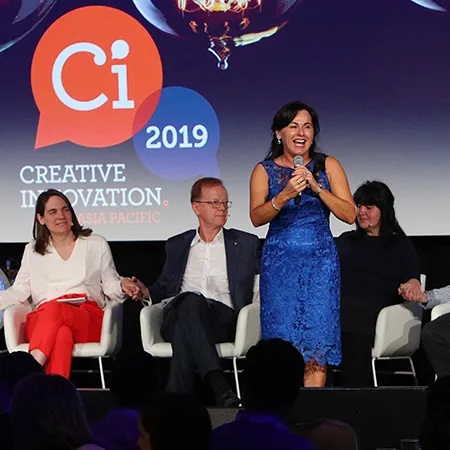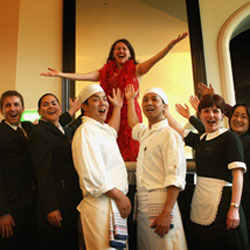The jobs of yesterday no longer exist and the jobs of tomorrow haven’t been invented yet. Over the next 5 to 10 years it is estimated that up to 40% of companies on the S & P will be disrupted by rapidly advancing technologies and the entrepreneurs adapting quickly to this new environment. And according to considerable research more than 50% of current Australian middle class jobs will no longer exist over the next decade due to robots, artificial intelligence and other new technologies. And some jobs will continue to exist but will be performed by those in cheaper labour markets overseas.
Inevitably there is a real risk that more and more people in our society will become even more socially isolated, disadvantaged and displaced because they cannot get work or they can’t keep up with the exponential pace of change. Social exclusion comes at a massive cost to our economy and society.
Social fragmentation and loneliness is increasingly becoming one of the biggest challenges facing the community. Loneliness is the global epidemic of our era. More than 2 in 5 people feel socially isolated and unheard. This leads to physical and mental health issues and economic disadvantage.
Our current life style places incredible demands on people and things to be faster. As a community we are more impatient, stressed, anxious and depressed as we race from one thing to the next. This lifestyle disproportionately impacts people from minority groups and those facing disadvantage including asylum seekers, migrants, people with disabilities and serious illnesses, those facing discrimination, racism, unemployment and isolation. It has created a significant divide that we need to bridge.
Compounding this, despite various attempts by governments and community organisations, the dominant Australian social welfare and engagement methodology is to group and support people from similar backgrounds or disadvantage. Although this approach provides for focused attention and is comfortable for participants, it also silos the individuals, reinforces segregation, entrenches labels (often based on a negative message), creates a dependency mentality, and ultimately traps individuals within their existing network, never giving them a chance to break out. This social welfare approach has been unsuccessful to date and disadvantage continues to rise across the nation.
With an ever-increasing influx of diverse people seeking a home here, we have a real opportunity to foster a new wave of entrepreneurship, creativity and innovation and create healthy communities bottom-up. Inclusive leadership will be paramount.
In the wake of anti-Muslim and other racist sentiments, there is an opportunity for all of us to choose to create a happy, healthy, inclusive and innovative Australia. This is about removing the ‘us and them’ mentality and acknowledging our common humanity. Ultimately we are more similar than different. It’s our perceived separation from others that creates a lot of our problems. We need to remove the boxes and walls between us and build bridges of understanding.
As a community we need to foster trust, understanding and goodwill. We mustempower all voices, no matter what their faith, background, disadvantage, disability or age. People need to feel like they have a place here, a true home, a sense of belonging, a sense of self and respect from others. Then they will truly be able to contribute to our future.
We need to redesign our social welfare ecosystem and bring together not-for-profits, social enterprises, governments, business and citizens to develop new innovative models to address our complex societal and community challenges.
We need to build tolerant, harmonious, inclusive and supportive communities that bring people together through their common interests, not differences. We need to train and develop the leaders to broker inter-community engagement through shared experiences, stories and activities. Currently there is a shortage of people capable of delivering these outcomes.
Emerging evidence and research shows that complex social issues can only be tackled successfully at a local level with whole-community involvement. Prevention and early intervention programs are the key.
Let’s find some ‘uber-innovative’ approaches to start solving these social problems now. In this new disrupted world it’s time we disrupted our failing social welfare model. Together we can help people connect, care and be cared for.
_______________________________________________________________
Tania de Jong AM is an acclaimed Australian soprano, award-winning social entrepreneur, creative innovation catalyst, global speaker and spiritual journeywoman. She is the Founder of Creative Universe, Creativity Australia, Creative Innovation Global, Dimension5 co-working hub, MTA Entertainment & Events, Pot-Pourri and The Song Room and works with diverse communities through Creativity Australia’s With One Voice choir social inclusion programs and the global community wellbeing video challenge Sing for Good. She works across the public, private, creative and community sectors. Tania speaks and sings around the world as a soloist and with her group Pot-Pourri releasing 7 CDs. She is Founder and Executive Producer of award-winning future-shaping events series, Creative Innovation Global. Creative Innovation 2016 will take place 7-9 November in Melbourne. Tania’s TED Talk How Singing Together Changes The Brain has sparked international interest. Tania recently released her solo CD Heaven on Earth.Tania’s mission is to change the world, one voice at a time!
Twitter: @TaniadeJong
www.creativityaustralia.org.au
www.taniadejong.com
www.creativeuniverse.com.au
www.ci2016.com.au





